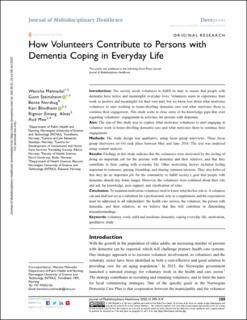| dc.description.abstract | Introduction: The society needs volunteers to fulfill its duty to ensure that people with dementia have active and meaningful everyday lives. Volunteers seem to experience their work as positive and meaningful for their own part, but we know less about what motivates volunteers to start working in home-dwelling dementia care and what motivates them to continue their engagement. This study seeks to close some of the knowledge gaps that exist regarding volunteers’ engagement in activities for persons with dementia.
Aim: The aim of this study was to explore what motivates volunteers to start engaging in volunteer work in home-dwelling dementia care and what motivates them to continue their engagement.
Methods: The study design was qualitative, using focus group interviews. Three focus group interviews (n=16) took place between May and June 2018. The text was analyzed using content analysis.
Results: Findings in this study indicate that the volunteers were motivated by the feeling of doing an important job for the persons with dementia and their relatives, and that they contribute to their coping with everyday life. Other motivating factors included feeling important to someone, gaining friendship, and sharing common interests. They also believed that they do an important job for the community to fulfill society’s goal that people with dementia should stay home longer. However, the volunteers were confused about their role and ask for knowledge, peer support, and clarification of roles.
Conclusion: To maintain motivation volunteers need to know what his/her role is. A volunteer can and shall not act as a substitute for a professional, only as a supplement, and the expectations must be addressed to all stakeholders: the health care service, the volunteer, the person with dementia, and their relatives, as we believe that this will contribute to diminishing misunderstandings. | en_US |

